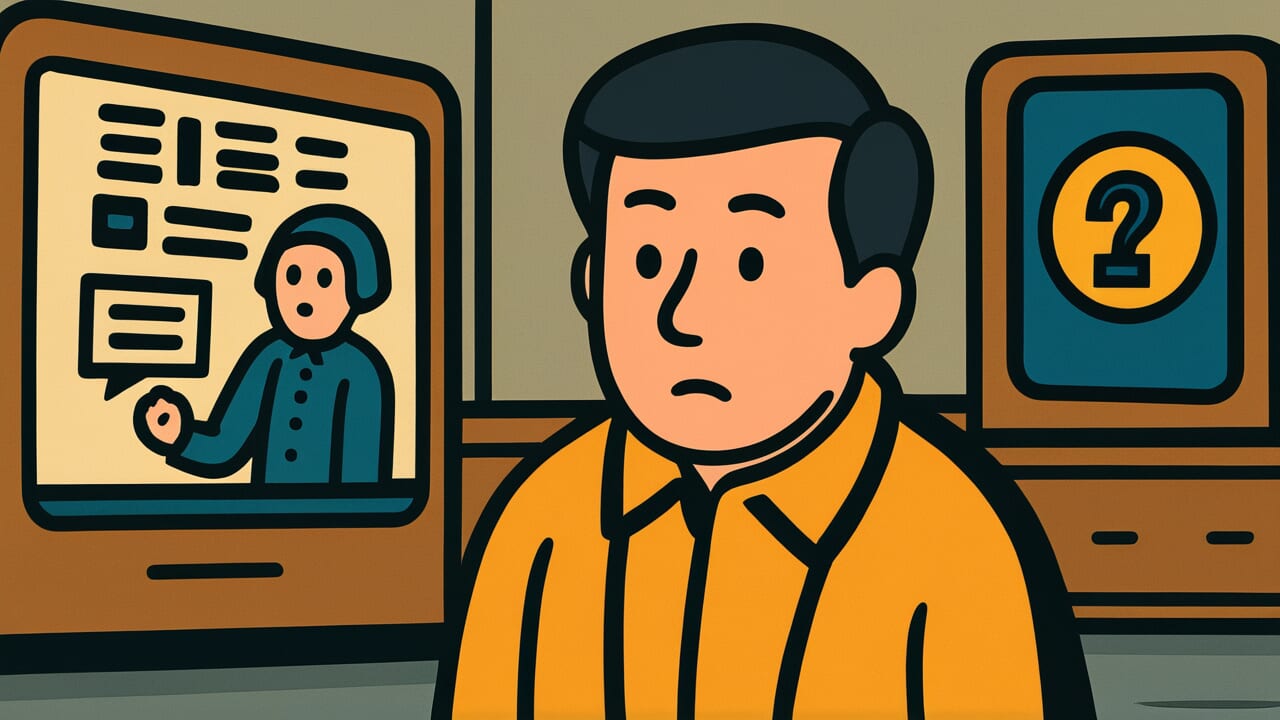How to Read “Those who are greatly deluded will not understand for their entire life”
Taiwaku naru mono wa shūshin wakarazu
Meaning of “Those who are greatly deluded will not understand for their entire life”
This proverb means that people trapped by fundamental misunderstandings or prejudices cannot grasp the true nature of things, even over a lifetime.
The term “great delusion” here doesn’t refer to surface-level mistakes. It points to deep confusion at the foundation of someone’s thinking.
People use this proverb when someone stubbornly clings to wrong ideas. It also applies when fundamental assumptions are so flawed that meaningful discussion becomes impossible.
Sometimes people use it as a warning to themselves. It reminds us to stay careful about missing the essence of things.
This saying remains important today. We live in an age overflowing with information.
When we first accept wrong information or values, correcting them becomes incredibly difficult. Once we form strong beliefs, even correct information struggles to change our minds.
Origin and Etymology
The exact source of this proverb has several theories. Scholars suggest it may have been influenced by ancient Chinese philosophy, particularly Taoist thought.
The term “great delusion” means more than small confusion. It refers to profound bewilderment at the fundamental level of life.
The character for “delusion” itself is revealing. It depicts a heart surrounded and unable to move.
In other words, it shows a heart trapped by something and losing its freedom. Adding “great” to this character emphasizes the severity.
It shows the confusion isn’t superficial. It’s so serious that it dominates the very foundation of someone’s thinking and judgment.
The phrase “will not understand for their entire life” is also striking. It doesn’t mean temporary misunderstanding.
It’s a harsh observation that someone will never reach truth throughout their whole life. This connects to the Buddhist concept of “ignorance,” meaning fundamental lack of knowledge.
This proverb emerged from deep human observation by our ancestors. They understood that human recognition and understanding have stages.
Once someone becomes trapped by major false assumptions or prejudices, escaping becomes extremely difficult. The saying warns about the danger of taking the wrong first step on the path to truth.
Usage Examples
- He treats his early mentor’s teachings as absolute truth, but as “Those who are greatly deluded will not understand for their entire life” suggests, he can no longer accept other viewpoints
- Once someone believes a wrong theory, “Those who are greatly deluded will not understand for their entire life” applies—no amount of evidence will change their mind
Universal Wisdom
The deepest truth this proverb reveals is the importance of “the first step” in human understanding.
We don’t see the world with a blank slate. We try to understand everything through filters of assumptions and values we already hold.
If the filter itself is distorted, no amount of effort will lead to correct understanding.
Why has this proverb been passed down through generations? Because humans have a deep tendency to believe what they want to believe and see what they want to see.
What psychology calls “confirmation bias” wasn’t discovered in modern times. Our ancestors knew from experience how difficult it is to overturn something people strongly believe.
What’s especially frightening is this: people trapped in great delusion are most convinced they’re right.
Because they have no doubt, they leave no room to accept new perspectives. The very attitude of seeking truth disappears.
This proverb therefore carries a profound teaching: be humble, always question your assumptions.
The awareness that no one possesses complete understanding is the key that opens the path to truth.
This saying looks at both the limits and possibilities of human intelligence. It’s a truly insightful observation.
When AI Hears This
The reason greatly deluded people never realize their state lies in a surprising structure revealed by cognitive science experiments.
Research on the Dunning-Kruger effect showed something remarkable. People who scored in the bottom 12 percent on tests estimated their ranking around the 62nd percentile.
In other words, people with lower ability overestimate themselves by more than 40 percentage points.
The frightening aspect of this phenomenon isn’t simple overconfidence. It’s a structural cognitive trap.
For example, someone who doesn’t understand grammar cannot spot mistakes in their own writing. Why? Because recognizing errors requires knowledge of correct grammar.
This creates a circular structure: recognizing your incompetence requires the very ability you lack.
Even more interesting is how lack of metacognitive ability fixes this state. Metacognition means the power to view your own thinking objectively.
People in deep delusion cannot even recognize they’re deluded. They evaluate external feedback using their own flawed judgment standards.
This means the circuit for accepting correct feedback doesn’t function. It’s a blind spot in the cognitive system, making self-correction extremely difficult.
Lessons for Today
This proverb teaches modern people the importance of regularly reviewing our thoughts.
What you consider obvious, what you never question—these assumptions might be worth stopping to examine.
Modern life makes this especially relevant. Social media easily connects us with people who think like us.
When surrounded only by comfortable information, our perspective narrows without us noticing. We risk falling into a state of “great delusion.”
That’s why we need to consciously encounter different viewpoints. We should listen to opinions that challenge our thinking.
If you feel “absolutely certain” about something, that might be a sign to apply healthy doubt.
People who truly understand something know the limits of their understanding. Maintaining flexibility—thinking “maybe there’s another way to see this”—is the key to continuing on the path to truth.
Don’t aim for perfect understanding. Instead, maintain an attitude of constant learning.
That’s the hopeful message we should take from this proverb.



Comments